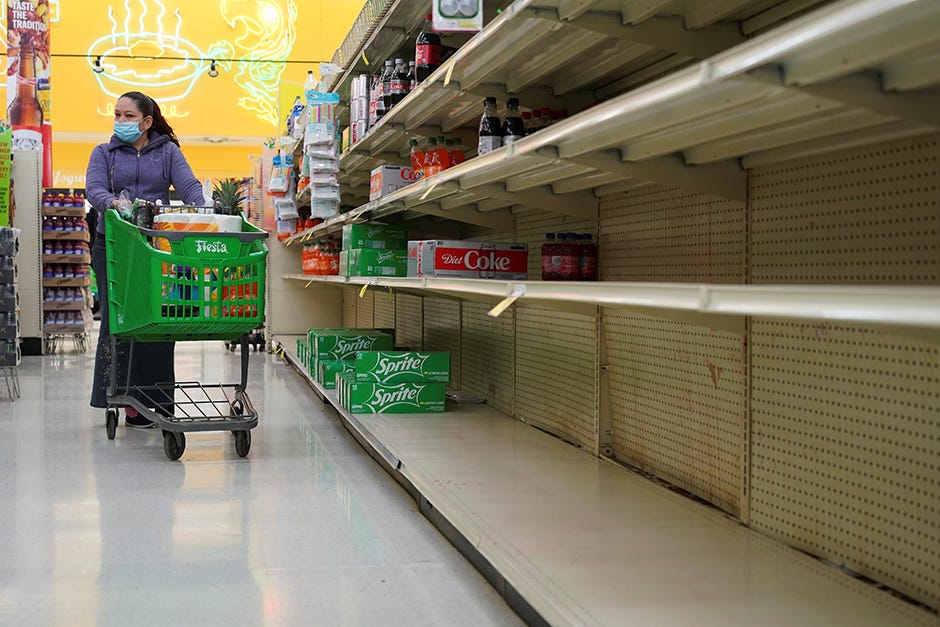"Transitory" Shortages & Inflation Are Actually Your Quality Of Life Being Stolen Right Before Your Eyes
The Washington Post published an op-ed urging Americans dealing with product shortages to lower their expectations. My response? Don't settle. Failed policies have our country devolving.
There’s no doubt our country has all of a sudden slipped into the most precarious state we’ve been able to readily confirm with our own two eyes in decades.
We are suffering from runaway inflation, we have a monstrous labor shortage, and products we normally would have abundant access to are missing from store shelves. The country doesn’t produce anything anymore, we have doubled our Central Bank’s balance sheet in under two years and the money supply has gone parabolic.
And engineering solutions for these issues requires correctly identifying where the problem is coming from to begin with. It appears we can either go one of two directions when we try to deduce the cause of these issues.
The first direction we can go in is to point to monetary and fiscal policy and look at their direct effects on the state of the country and our economy. This, I believe, is the pragmatic approach to solving the issues our nation faces.
The second direction, according to a new Washington Post op-ed, is apparently to blame and shame ourselves for being greedy and assuming that we ever deserved such a quality of life to begin with.
The Post recently published a piece called "Opinion: Don’t rant about short-staffed stores and supply chain woes”, which put this argument on the table, basically telling people to shut up and be thankful for the little they have.
While normally I embrace the idea of being humble and thankful no matter how much or how little you have access to, the Post’s opinion piece brings an interesting concept into the foreground that I want to examine: what I am calling “the quality of life con”.
Let’s have a look at what the op-ed, written by award winner Micheline Maynard, argues. Maynard’s website notes that prior to working at the Washington Post, she worked for The New York Times and NPR.
In the op-ed, a photo of empty store shelves - very similar to the ones I used to effectively make my argument that the U.S. is turning into a third world country - accompanies an argument that it’s “time for some new, more realistic expectations,” as “Americans’ expectations of speedy service and easy access to consumer products have been crushed like a Styrofoam container in a trash compactor.”
"American consumers, their expectations pampered and catered to for decades, are not accustomed to inconvenience," the op-ed states.
Its a convenient argument to make now, since when I make this “anti-comfort” argument about the importance of having a recession/depression and the Fed not stepping in the way every time those very same pampered consumers feel a little bit of financial unease, it is the left that casts me away as a conspiracy theorist and lunatic for advocating ushering in discomfort. Now, all of a sudden, because their policies brought on discomfort, the narrative changes to “lets all stop being so pampered all the time”.
"Rather than living constantly on the verge of throwing a fit, and risking taking it out on overwhelmed servers, struggling shop owners or late-arriving delivery people, we’d do ourselves a favor by consciously lowering expectations," the piece says.
While I agree with not taking out our rage on service workers, like bartenders and servers - I was one for more than a decade and can tell you firsthand it doesn’t accomplish anything - this continues to fall under the “simply don’t be a dick” ruleset, and has nothing to do with “consciously lowering expectations” for our quality of life across the board.
And this segues nicely into my discussion about what I have called “the quality of life con.”
Seeing the left finally address our quality of life marks an interesting paradox for them. Often, I have argued that our quality of life deteriorating is one of the hidden gears that turns in the background as a result of rising inflation and poor monetary policy in our country.
Quality of life needs to be talked about loudly because it can (and will) be whittled away at without being noticed until, one day, you wake up and your quality of life is much poorer than it was years ago. This is akin to the “weighted blanket theory” case against the Federal Reserve I made on YouTube earlier this year: it falls on you slowly, and you don’t notice it until it’s too late.
On a day by day basis, quality of life can be washed away by things like shrinkflation, higher prices, and exactly what Maynard is arguing for in her op-ed: lowered expectations.
The convenient thing about lowered expectations is it makes it easier to not notice when your quality of life is being stolen from you. And I say “stolen” because if you are a normal productive, taxpaying member of the country, you would assume that your quality of life should improve or at least hold steady. After all, that is what most of the point of productivity as a part of capitalism is. It is what has gotten us from black and white televisions with two channels to 100 inch plasma screen TVs playing whatever we want, on demand from the internet, in the course of just a couple of decades.
And it seems to be that everyone can agree in unison - both the left and the right - that we all want our quality of life to improve. We measure the success of our country by things like GDP, infant mortality rate and life expectancy, all numbers that tend to improve as our quality of life improves.
I have made the argument that quality of life is a very subjective measure that is difficult to wrap our heads around, and this is why cultural Marxists in our country think that they can implement time-tested destructive ideologies, but will still be able to walk around with their iPhones and their Starbucks lattes in the years following their successful overthrow of capitalism.
They don’t understand that their quality of life will not remain the same under such policies.

But because there is no real way to measure or model quality of life on a minute-by-minute basis in most households, and because the left doesn’t seem interested in looking at history for the answer, quality of life becomes this subjective gray area that can be used as a dumping ground for ideological screw-ups when convenient and, in the case of this WaPo op-ed, as a lever to try to get the American public to accept the consequences of the failed policies that led us to inflation and product shortages to begin with.
Again, I think it is appropriate to always be thankful and humble about what we have, but we should stand firm in the expectation that we want our quality of life to continue to progress instead of regress.
The left swears that socialism and Marxism are the best ways to help those in our country and outside of our country who are in need. But the truth is we can best help the rest of the world - and humanity as a whole - by ensuring that our own two feet are firmly planted in the ground first, and that our quality of life remains, at worst, steady. This is why, on an airplane, they ask you to put on your mask first before helping others with their masks.
And so, without even knowing that she was doing it, the author of this op-ed is using quality of life as a dumping ground to try and divert the consequences of insane monetary and fiscal policy.
She’s also bringing to the foreground a concept that, if we paid more attention to it, could help us understand far more deeply why our policies are flawed to begin with.
The point is we should not be happy about the fact that the country is devolving before our eyes, we should not accept the theft of our savings via inflation and we should keep a keen eye on our collective quality of life as a country.
After all, quality of life is what decades of rugged productive individuals in this country fought for at war and worked for back home.
I think my point is best made through Maynard’s own words.
Very likely unaware of some of the historical analogues she was making, she wrote:
"The other day I found myself carrying home a loaf of bread in my bare hands because the bakery had run out of bags. Back when we didn’t know how good we had it — circa 2019 — I might have been annoyed by the inconvenience. Now I was just glad the bakery was still in business."
—
This is a free look at paid subscriber content from QTR’s “Fringe Finance”. If you enjoy and wish to support the content, you can subscribe here:








She is aware that she got the bread.
Two points:
First: One of your most important columns... should be pinned for all new subscribers.
Second: I couldn't figure out why I haven't seen a column from you lately. Is raven slacking? Then I realize... both you and El Gato Malo have been being sent to Junk Mail by Outlook. Coincidence I'm sure...
Bonus: The first thing I will say to maynard is... you want us to live on less? Well you first amigo...